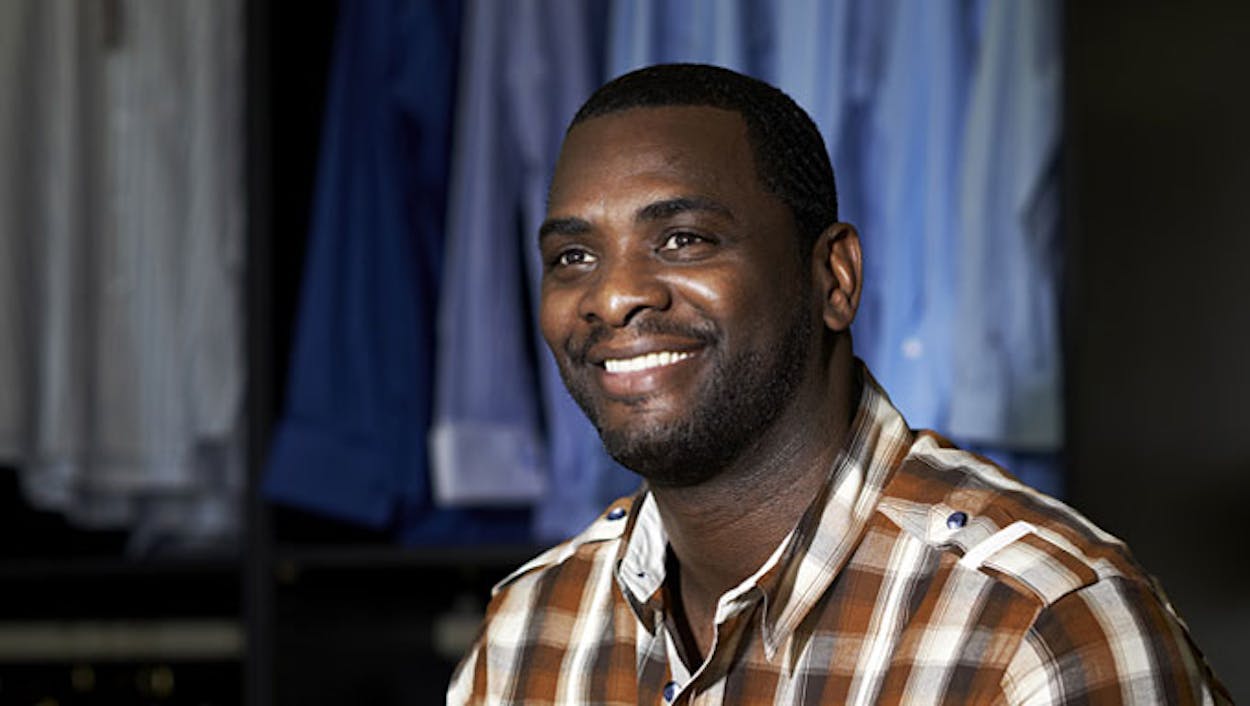Christopher Scott planned it all from an uncomfortable state prison bed at the Coffield unit in East Texas, where he would kick back, listen to R&B and daydream. Some day the criminal justice system would recognize that he was not, in fact, a murderer. He would be exonerated, and he would work to save other wrongfully convicted people. He would fulfill his lifelong dream to open a men’s clothing store. He would live in a sprawling home with a swimming pool and a basketball court.
Somehow, even as twelve years passed, it all felt possible.
“Isn’t it so crazy that everything happened?” he said recently, sitting in the lounge of his men’s wear store in Cedar Hill, outside of Dallas suburb.
He used the money he received from the state as compensation for his wrongful conviction to open Christopher’s Men’s Wear, in the Uptown Village at Cedar Hill on Black Friday 2011, two years after his release from prison. He designed the store like his walk-in closet, where it is easy to mix and match while browsing through racks of suits, sweaters, dress shirts, and sportswear.
Scott has come a long way since 1997, when he was convicted of capital murder. A woman whose husband was shot dead by men who were burglarizing their home identified him in a police lineup after he and a friend (his co-defendant) were arrested. There was no physical evidence; the police relied on eyewitness testimony, and he was convicted. The judge sentenced the 27-year-old to life in prison, effectively ending the life he knew.
For nearly thirteen years, Scott wore the white prison-issued uniform every day. It was an affront to a man who always took pride in his appearance, but he tried to maintain his sense of personal style. On weeks when his family would visit, Scott mixed starch and water and toweled it onto his uniform to smooth the fabric and crease the pant legs. Once it dried, he folded it neatly and slept on it to secure the creases.
Then in 2009, Scott caught a break. The killer confessed, and he was released on October 23. At his exoneration hearing, about a dozen visitors, all exonerated men from Dallas County, sat together, wearing suits, polished shoes, and diamond jewelry.
The spiffy look is unique to the Dallas group, according to Karen Wolff, a social worker with the Innocence Project. “That’s just who they are; they’re just regal,” Wolff said. Seeing the men, she added, is “like you walked into some kind of conference for large, snappy-dressed black men. It’s a sight.”
Johnnie Lindsey, now one of Scott’s close friends, was among the exonerated at his hearing. His style is more conservative; it’s “old school” and Ivy League, he said. After 26 years in prison, dressing well, for him, means feeling proud. And with the state compensation provided to exonerated prisoners, he and the others can afford nice clothing. (It helps that Scott’s store offers a twenty percent discount to exonerated men.)
“Most of the guys know, whenever we have an engagement and we all have to be there, everyone is dressed properly,” Lindsey said. Scott’s store is both a convenience and a physical reminder of the group’s expectations. They have an image to uphold, and it’s not that of criminals.
Dr. Jaimie Page, co-director of the Texas Exoneree Project and a social work professor, said that as more exonerations took place and the group became a brotherhood, fashion became part of their culture.
“Part of it is very deep and meaningful, and part of it is fun,” Page said. “It helps with their new identity. It helps with their self-image and self-esteem.”
Steven Phillips, another of Scott’s close friends, was also at his hearing and helped him with money and a place to live after his release. “I always ask him, what are you going to wear, man?” And Scott will tell him, “casual-nice or casual-sharp” or some other nuanced variation.
Phillips said he took a cue from Scott and started wearing fedoras instead of Rangers baseball caps. “I’m not going to show up not looking sharp,” Phillips said.
It takes time to cope with the effects of wrongful incarceration and to adjust to freedom, yet clothing is easy to change. “When you change the way you look, you will change the way you act,” said Richard Miles, who knew Scott from their time in prison and who also started his own group, Miles of Freedom, to assist newly released inmates.
“We don’t always want to be looked at as exonerees; we want to be looked at as men,” Scott said. “When we walk into the public eye, I want us to be looking our best.”
And these men spend a lot of time in the public eye, advocating for criminal justice changes in Austin and appearing at every local exoneration hearing.
Scott also started a nonprofit organization, House of Renewed Hope. He focuses mainly on cases like his, in which there is no DNA evidence to disprove the conviction. He believes so strongly in his work to free other innocent prisoners that he has boxes of clothing set aside for them. A. Tiziano, a brand of upscale sportswear that his store carries, donates to his collection.
“Not only do I work their cases,” Scott said, but also “when they get out, I can put some clothes on their back.”






